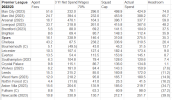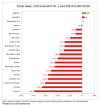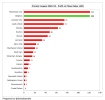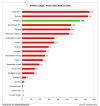
It now looks almost certain that the new Premier rules for spending, to be fully introduced in the 25/26 season will be based on player spending caps.
For the majority of clubs, who do not qualify for Europe, then it will be a 85% cap, for those qualifying a 70% cap. The aim is for a figleaf of competitiveness.
The table shows Wolves were close to hitting the targets for 70%, so a little wiggle room there. Also clear which clubs are going to be in selling mode at the end of this season.
Its a very incomplete set of figures, however, and I cannot yet find a better, more coherent presentation of what the spending limits are actually going to be.
For instance, where does the shift to a formal spending cap leave allowable losses. Take Wolves for example: operational costs for running the club, outside of player expenses, currently at around 40m pa. With an 85% cap, Wolves would be looking at around a 10m deficit per annum. So the question is then: what can the rest of the allowable losses be used for? Will clubs be allowed to spend more on players up until the 35m current limit on losses? Or would any further investment by club owners have to go towards non-playing purposes, such as ground improvements?
And how are spending on academy players, the women's team, community projects and involvement to be interpreted? If these run at 5% of turnover, does that mean that clubs can in fact go up to 90% spending on players, when this 5% is taken out?
Third obvious question: the league has to find some kind of solution to the chaos caused by making points deductions during the season. It seems that minor examples of over-spending, will only invoke financial penalties. So doesnt that then become just part of what an aspirational club will budget for, to maximise their buying power in the market? How do the rules deal with cynical attempts to find loopholes, but loopholes, which are after all only attempts to compete better in a financially rigged league?
And when should sanctions be applied, so that clubs that abide by the rules are not being punished for doing that?
Another question: where do expenses on coach and coaching staff fall? Changing a coach involves substantial amounts in compensation, so how can this be budgetted for?
So, for me, an awful lot of issues to clarify, before any judgement can be made. The Premier league's main concern has clearly been to bolster the financial advantage of the top six, as they have emerged and solidified over the last 12 or so years. Removing any possibility of a Benefactor coming along has been the priority, and the system for doing that is now pretty much complete.
VAR has shown that ill-thought out changes can create worse and more problems that they solve. Are we heading for a financial VAR??




